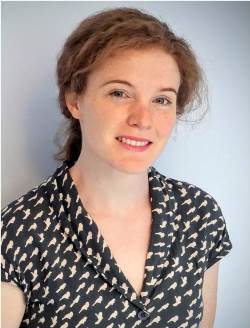Profile of Dr Hannah Joyce
Hannah is a University Lecturer in Electronic Materials and Devices

How did you get into Engineering?
Choosing a university course was a really difficult decision. I loved maths, physics, chemistry and languages, and I wanted to study them all. Fortunately, my decision was made easier because my university offered me the opportunity to study for a Bachelor of Science degree and a Bachelor of Engineering degree concurrently (a double degree) over 5 years. I loved both degrees and ended up specialising in two very different disciplines: pharmacology and electrical/electronic engineering. Then I undertook a PhD in physics. I love how my engineering degree allows me to move easily between different disciplines such as physics, biomedical sciences and chemistry.
What are you doing now and what are your plans for the future?
I joined the Electrical Engineering division in late 2013 as a university lecturer. My research focuses on engineering new nanomaterials. I’m particularly interested in nanowires – these are tiny wires with diameters less than 1000th the diameter of human hair. Nanowires have some remarkable properties which make them very useful in, for example, solar panels, flexible displays and tiny lasers.
What motivates/interests you?
I love the thrill of discovering and creating new things. In the longer term, I want my research to improve our quality of life. I’m concerned about climate change and hope that my work will help solve energy problems, for instance through the development of affordable efficient solar cells.
I also really love teaching and interacting with students. Sometimes I forget how much older I am compared to the undergrads...
What has helped your career?
I’m really grateful to my Mum, Dad, grandparents and extended family for encouraging me to pursue my interests in science from an early age. I was also lucky that at my secondary school the teachers were excellent and students could be “brainy” and remain well-liked. I have benefitted from some excellent supervisors and mentors, especially during my PhD and postdoc. They remain a really strong source of support and I’m truly grateful.
How have you overcome challenges/knockbacks in your career?
As an undergraduate and as a PhD student, I always kept my head down, worked hard, and hoped that my achievements would be noticed. This worked really well while I was a student. However, as I progressed upwards through the academic system, I realised that my lack of self-confidence and risk-averse nature were holding me back. For example, it was a painful experience when one of my early grant proposals was criticised for “lacking ambition” and being “low risk.” To overcome this, I have been training myself, with the help of colleagues, to be more courageous!
How have you managed to balance family life/other interests with your career?
My husband and I both work in the Engineering Department. We’re expecting our first baby in November 2016 and we’re both really excited about becoming parents. I will have to let you know how we cope when the time comes!
Do you have any role models?
There are several female engineers and physicists who have inspired me, and I think they will be really embarrassed if I identify them. Two who spring to mind were my lecturers while I was an undergraduate at the University of Western Australia: Prof. Gia Parish and Dr. Jasmine Henry. During my PhD at the Australian National University there were a number of female academics who inspired me, especially A/Prof. Jenny Wong-Leung, A/Prof. Jodie Bradby and A/Prof. Fu Lan. What struck me about these women was that they were excellent at their jobs and at the same time they were also normal, kind, wonderful people.
Do you have any advice for women who considering studying/pursuing a career in Engineering?
Often, female engineers are advised to be more confident. That is not easy, because confidence (or lack thereof) can be an integral part of someone’s personality. Also, I think a healthy level of self-doubt can actually be a hallmark of a truly excellent scientist and engineer. But there is a threshold and too much self-doubt can sabotage you. To overcome this, try to be aware of thoughts of self-doubt, try to believe in yourself, and remember to gain joy from your work and studies.
